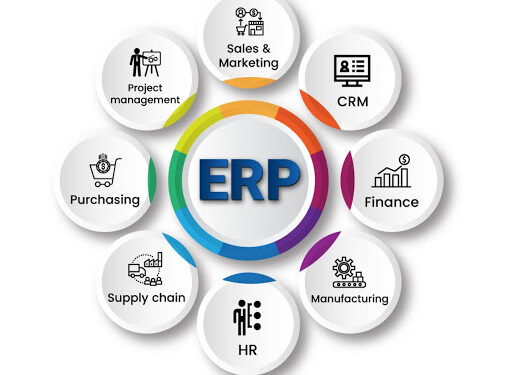Enterprise resource planning (ERP) refers to a type of software that organizations use to manage day-to-day business activities such as accounting, procurement, project management, risk management and compliance, and supply chain operations.
As disconnected data sources are linked on a single platform. An ERP interface helps you run your transactional data sets through analytics and discover information about patterns or problems that aid in strategic planning or problem-solving.
Knowing what are the best options at your fingertips to lead your company to business success today is critical. We are going to help you understand Enterprise Resource Planning ERP software, and how it integrates its key internal systems to help you manage your business more efficiently and accurately.
A typical ERP looks at the main business processes for finance, accounting, sales, marketing, CRM, human resources, and inventory. Some systems include specific components. Like project management and manufacturing.
While ERP used to be expensive and limited to business systems sold by major brand vendors such as SAP and Oracle. Today, small and medium-sized businesses have access to a host of flexible and cost-effective cloud-based ERP solutions.
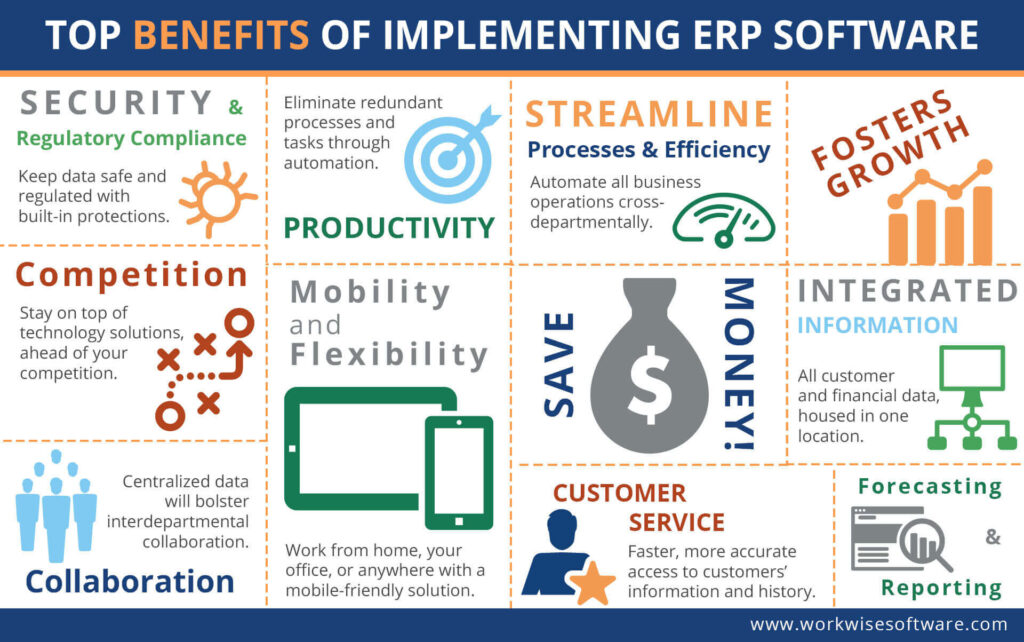
Why do companies implement an ERP?
Fighting fraud by centralizing accounts payable and using AI or machine learning to make smart payment decisions are just a few key factors why companies opt for ERP, according to CIO reports.
However, implementing an ERP is far from an easy task. A study by Technology Evaluation Centers revealed that approximately 50% of ERP implementations fail on the first attempt, and is why choosing the correct solution is critical.
In this guide, we will introduce you to the best ERP software systems and help you identify their advantages and strengths. The goal is to help you find a match between your needs, and the applications these solutions can provide to power your business objectives.
Odoo:
Odoo ERP is a fully packaged management solution built on an open-source framework. It has modules for accounting, project management, human resources, inventory, purchasing, manufacturing, and a large collection of management applications.
As an extended ERP. It also integrates natively with web-building, e-commerce, POS, CRM, and sales applications, giving you a robust, centralized platform from which to run the company’s key business processes. The solution is suitable for both small businesses and large companies.
As an open-source platform, Odoo is a source of compatible applications for more functionalities. More than 300 applications are developed monthly on its platform spanning various business and productivity applications. For a growing business, Odoo presents a scalable platform with more sophisticated features as the need arises. You have more than 1000 modules to choose from, and you can develop your own applications through their API.
You can replace most of your business applications with Odoo. Or integrate your current applications into the system’s ERP. That sounds ambitious if you don’t have a technical team. But Odoo is known as one of the easiest ERP to implement and develop for businesses’ of all sizes and verticals.

Oracle Netsuite:
Netsuite ERP is a trusted brand and considered one of the most widely implemented cloud-based platforms. It is rich in features, and t is designed to adapt to the needs of growing companies. Which makes it an ideal platform for medium and large companies. As the central hub for key business processes. The ERP system integrates inventory management, revenue management, financial management, fixed assets, order management, and billing.
Netsuite excels at managing your financial records. Including monitoring and control of expenses. The system provides real-time monitoring also on critical metrics such as financial close, revenue, and global financial performance.
In the same way. You will maintain a close relationship with your inventory processes from acquisition to payment. A key tool in this module is the vendor self-service feature, which enables automated and simplified buyback. which can also be done in a more advanced way on Odoo.
The system also eliminates manual bottlenecks in the order-to-cash workflow. Netsuite ERP establishes a seamless pre-establishment and approval process from sales quotation to fulfillment, billing, and collection. With integrated sales, finance, and compliance. Your business runs efficiently without the need for a lot of manual work.
Further, managers and staff can customize their dashboards individually to display the key metrics that are important to their role. It also has a complementary module, Human Capital Management. To help you assess staff productivity and provide a data-driven path to improve performance.
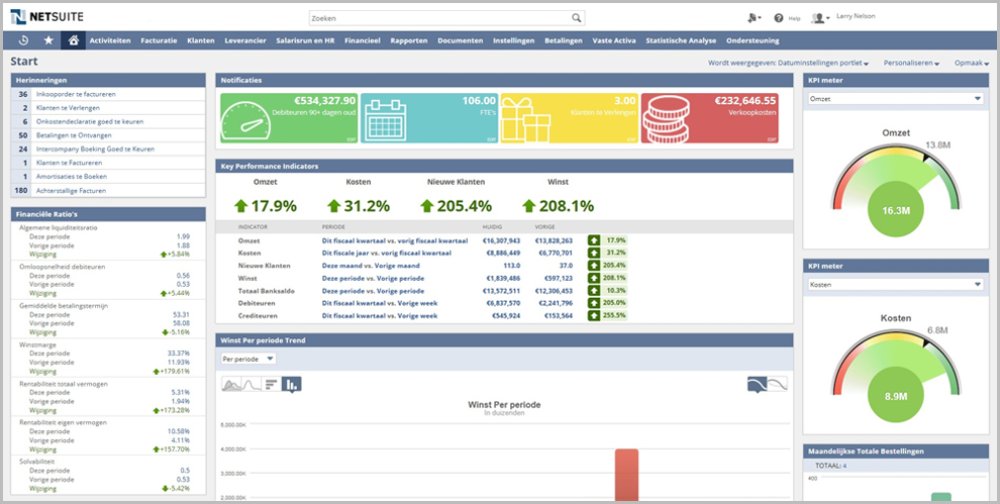
Sage Intacct:
Intacct describes itself as the “only ERP you’ll ever need” and it’s not without foundation. The system has a wide set of modules that cover the majority, If not all of your transactional processes. It has basic accounting features from Accounts Payable / Accounts Receivable, to Cash Management and General Ledger. It has a contract and subscription billing and fixed assets. Plus supports multi-entity and global consolidations, and provides sales, and use tax processing.
The system is applicable to a wide range of industries such as healthcare, wholesale and retail. It is also ideal in areas with strict financial regulations.
Despite having a sophisticated infrastructure for accounting capabilities. Intacct is quite easy to learn. There are interactive videos and introductory webinars to make onboarding easier. Similarly, you can customize the built-in reports in a way that makes sense for your processes.
You also have a set of charts, tables, and dashboards that you can modify to present important metrics. The system can also be configured in automation to calculate recurring figures such as commissions, returns, sales orders, and purchase orders. However. It has user permissions and access control to protect data against information breach.
Another key benefit of Intacc is its extensive integration. Sage Intacct Marketplace enables you to integrate the system with other top-of-the-line applications that complement ERP processes, such as online payments, CRM, and travel management. Some of the big names include Salesforce, ADP, Expensify, and American Express.
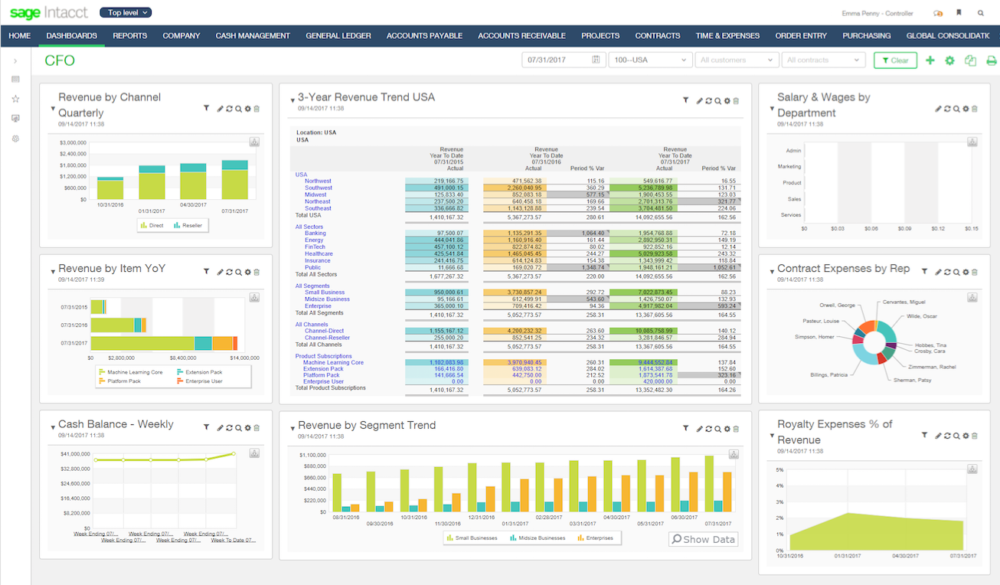
Brightpearl:
Brightpearl is an omnichannel retail management solution that streamlines back-office workflows and enables you to focus on growing the business. As an ERP platform, it integrates key business systems.
Namely: Inventory, Accounting, Order Management, CRM, Supply Chain, Fulfillment, Reporting & Analytics, and POS.
Allowing you to consolidate the products and processes of various business units, including sales, purchasing, marketing, finance, and e-commerce. Its full set of features is clearly aimed at medium-sized and large companies.
The system is especially useful for multi-channel retailers looking to provide efficiencies in managing different sales channels in one place. Additionally, retailers can consolidate various disconnected but relevant data on customers, orders, inventory, sales channels, accounting, and more, and discover patterns or insights that are critical to strategic planning or day-to-day decisions.
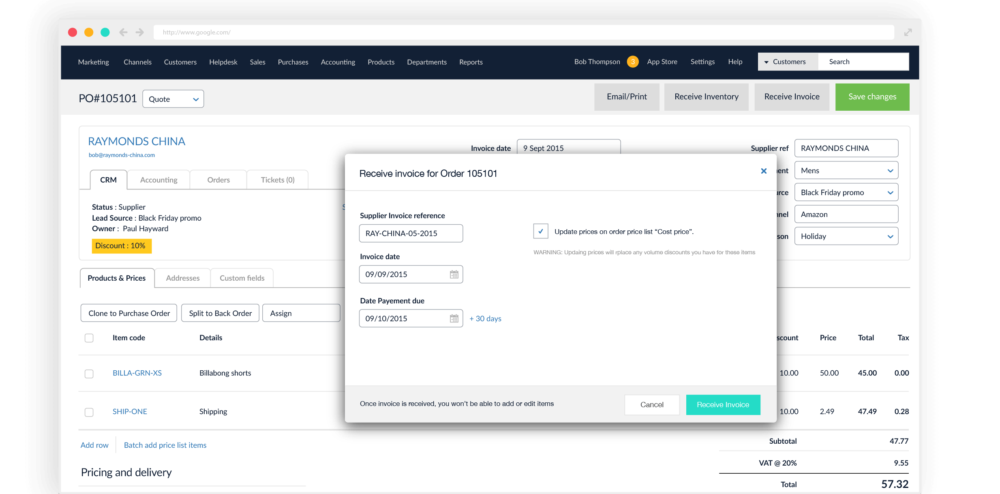
Brightpearl is competitively priced. Giving you modularized plans to scale functions as your business grows. Instead of implementing different systems for each sales channel. The platform can tie these channels together and integrate with popular eCommerce platforms like Amazon, eBay, BigCommerce, Magento, and Shopify.
With a consolidated system, your inventory is easier to manage and supply levels are monitored. Each sale updates inventory in real-time and avoids under and over storage. Also, another key benefit is the automation of the accounting process, freeing yourself from time-consuming accounting. Orders, payments, and billing are automatically entered into the records. You can easily extract the data at any time or combine it for analysis. Further. This central data center becomes the key to generating reports that help you make informed decisions.
As a cloud solution. Brightpearl can be accessed from anywhere and at any time from a wide range of devices.
Conclusion
As you have seen, these are all very powerful applications. Based on our experience, we find Odoo to offer the best overall platform for mid-sized businesses because it unifies and consolidates everything that the other ERP management applications offer. Everything in one place. Unlimited use and with an almost unlimited number of modules to further extend all the functions that will be needed. If you need any help related to Odoo ERP, we recommend finding a software and IT development company that specializes in ERP systems to help develop and implement the right system based on your business needs.
Founder & Managing Partner of Trajectory Capital and CEO Trajectory ALPHA Acquisition Corp NYSE: TCOA.
Lifetime entrepreneur, mentor, Board Member obsessed with the infinite realm of possibility in the digital transformation of the world. Founder & Board Member TruVest, MainBloq. Board Member Beasley Media (NASDAQ: BBGI) Kubient NASDAQ: KBNT, Fraud.Net, Hoo.Be, MediaJel



















































